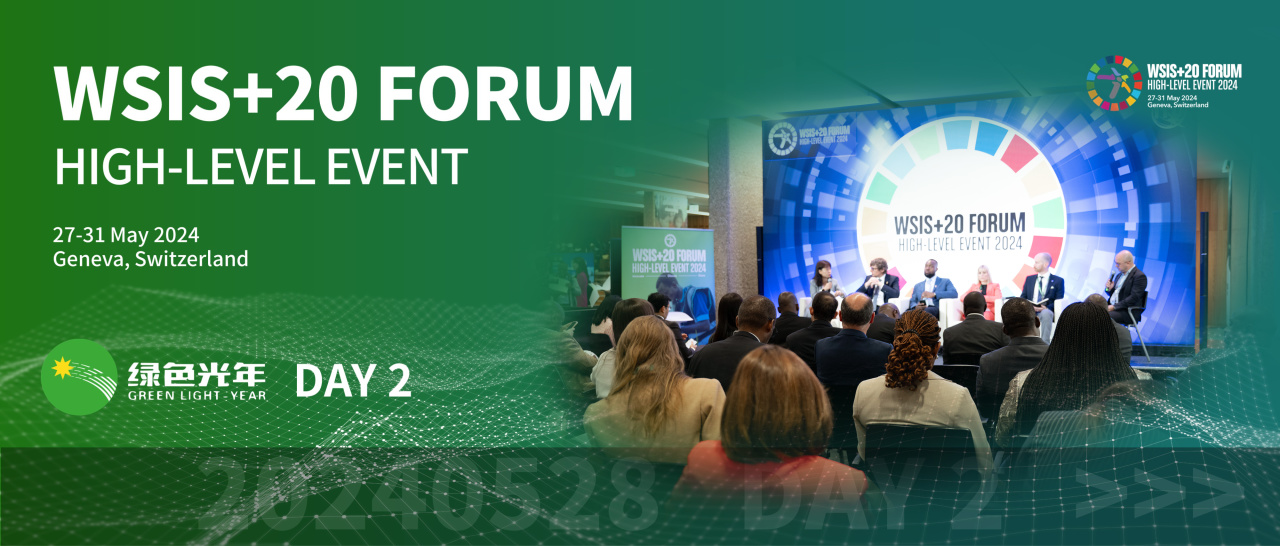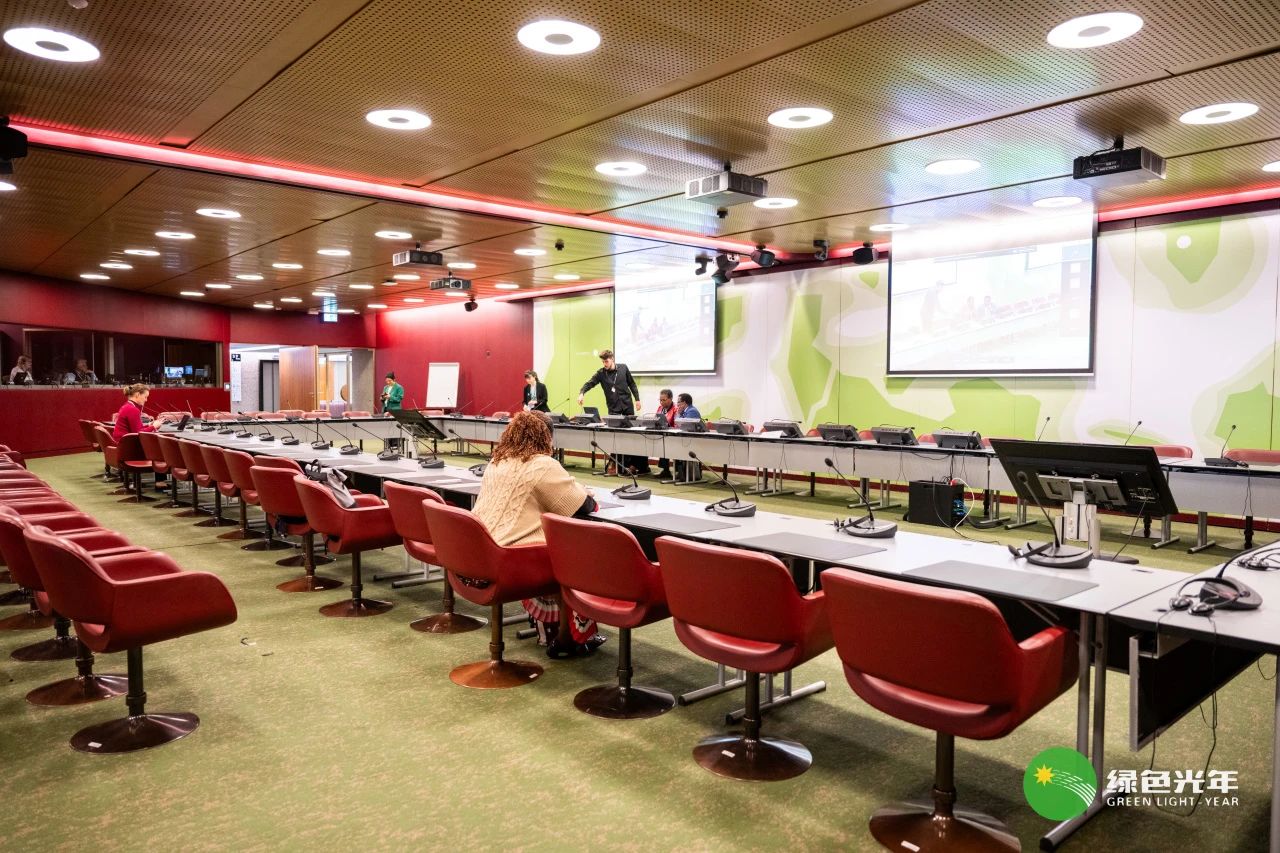
The World Summit on the Information Society (WSIS) is a two-phase United Nations (UN) summit, first introduced by Tunisia in 1998. The summit aims to create an evolving multi-stakeholder platform to address issues raised by information and communication technologies (ICTs) at the national, regional, and international levels. The goal is to build a people-centric, inclusive, and development-oriented Information Society where everyone can create, access, utilize, and share information.
The WSIS Forum is an annual multistakeholder event within the WSIS process. The forum is hosted annually by the ITU and co-organized by several UN organizations. The WSIS Forum’s process aligns with that of the SDGs. The forum’s program is collaboratively curated through crowdsourcing, promoting extensive ownership and facilitating continual improvements. The WSIS Forum in 2024, branded as WSIS+20 Forum High-Level Event 2024, will take place on 27-31 May 2024 in Geneva, Switzerland, and will serve as a platform to provide multistakeholder discussions and to take stock of the achievements and key trends, challenges and opportunities since the Geneva Plan of Action in 2003.
The Green Light-Year Youth Delegation arrived in Geneva on May 25. This article shares insights from the second day of the GLY Youth Delegation’s participation in the conference.
Featured Photos


Wenzu Gong
Team leader
Digital SDG4 Around the World – Bring Educational Toolist Alive
As technology becomes increasingly integral to educational frameworks, it not only enhances the accessibility and inclusivity of learning but also tailors educational experiences to fit the diverse cultural and linguistic needs of students worldwide. Digital transformation is pivotal in achieving Sustainable Development Goal 4 (SDG4), which aims to ensure inclusive and equitable quality education and promote lifelong learning opportunities for all. Ambani Afirca is one of the best educational toolist in the WSIS+20.
1. Ambani Africa’s Innovative Digital Tool
Ambani Africa is a groundbreaking digital education tool designed primarily for children aged 3-9. This innovative platform brings educational content to life through technology, addressing the unique cultural and linguistic challenges faced by young learners. One of the standout features of Ambani Africa is its ability to visualize textbook images. Using a smartphone to scan a book, children can see the images come alive in 3D. This interactive experience includes teaching pronunciation, reading skills, and providing engaging content that immerses children in the learning process.
This method is particularly effective in teaching endangered local dialects, helping to preserve cultural heritage while providing modern education. The platform currently supports over ten languages, including Chinese, demonstrating its broad applicability and commitment to linguistic diversity. By making learning interactive and visually engaging, Ambani Africa enhances children’s educational experiences and promotes better retention and comprehension of the material.
2. The Impact of Ambani Africa
The immersive learning approach adopted by Ambani Africa has profound implications for achieving SDG4. By making education more interactive and personalized, the platform helps bridge the gap between traditional learning and modern digital education. Children from diverse backgrounds can access quality education tailored to their cultural context, thereby promoting inclusivity and equity.
Moreover, Ambani Africa’s focus on local dialects ensures that even the most marginalized children can access education in their mother tongue, fostering a sense of identity and pride in their cultural heritage. This approach aligns with the goals highlighted in UNESCO’s initiatives for transforming education through digital learning, which emphasize the importance of culturally responsive educational content.

Jiazhou Ni
Vice team leader
Today we focused on the theme of Action Line 7 – eLearning and participated in the thematic session of this action line. The session featured keynote presentations by Dr. Tawfik Jelassi
(UNESCO Assistant Director-General for Communication and Information), H.E. Dr. Emilija Stojmenova Duh (Minister of Digital Transformation SLOVENIA, Ministry of Digital Transformation SLOVENIA), Dr. Emmanuel Manasseh (Regional Director a.i for Africa, ITU Regional Office for Africa), Ms. Carol Roach (Under Secretary, Cabinet Office, Government of The Bahamas), Ms. Zeynep Varoglu (Senior Programme Specialist, UNESCO).
One of the main challenges we face is the digital divide. Not only a digital divide in the pure sense of the word, but also an information divide, a knowledge divide and an education divide. Such divides have the potential to widen existing inequalities as they not only separate the rich from the poor, but also marginalize the less privileged in society. In this session, we saw many organizations making changes and taking action at the education level – empowering educators and learners, enhancing teacher training and e-learning, and promoting digital inclusion.
In the second phase of the session, we had a discussion on the impact of emerging technology tools, such as generative AI tools, on education and learning. During the exchanges, the speakers hoped that generative AI tools would be used as assistants for teach.

Kefei Chen
Team member
The 2022 annual report and the 2023-2027 strategic objectives of the Globethics.net place a strong emphasis on digital ethics. In our technologically advanced society, AI ethics are increasingly coming to the forefront and gaining significant importance. By examining today’s exhibition and reviewing the resources available on the Globethics.net’s official website, we can delve into the reasons behind this growing focus.
1. Ethical Leadership and Responsible AI
Globethics emphasizes the importance of ethical leadership in all sectors, including AI, to foster a just, inclusive, and sustainable world. Ethical leadership is crucial in guiding AI development and deployment to ensure it serves humanity positively rather than exacerbates inequalities or ethical dilemmas.
2. Addressing Global Challenges
The reports highlight the role of AI in addressing significant global challenges such as sustainability, environmental justice, and inclusive governance. However, without ethical guidelines, AI could potentially be misused, leading to negative consequences such as increased surveillance, bias, and discrimination.
3. Inclusivity and Equity
Globethics stresses the importance of inclusivity and equity in the digital realm. Ethical guidelines are necessary to bridge the digital divide, ensuring that AI benefits are accessible to underrepresented and marginalized groups. This inclusivity ensures broad societal participation and helps prevent the exacerbation of existing inequities.
4. Governance and Standards
Establishing ethical standards and governance frameworks for AI is essential to ensure transparency, accountability, and fairness. The reports indicate that ethical standards in AI can help in mitigating risks associated with AI technologies, such as privacy violations, job displacement, and ethical misuse.
5. Academic and Policy Engagement
Globethics advocates for integrating ethics into higher education and policy-making. By embedding ethical considerations in AI education and policy frameworks, future leaders and policymakers can be better equipped to handle the ethical challenges posed by AI technologies.
6. Sustainability and Environmental Justice
The 2022 Annual Report and the 2023-2027 Strategy highlight the intersection of AI with sustainability and environmental justice. Ethical frameworks in AI can guide the development of technologies that support sustainable practices and environmental protection, ensuring AI contributes positively to global sustainability goals.
7. Digital Ethics and Emerging Technologies
The focus on digital ethics within the Globethics Strategy underscores the critical need for ethical standards in emerging technologies. As AI continues to evolve, ethical guidelines are essential to navigate the complex moral landscape, ensuring AI advancements align with human values and societal good.
Conclusion
The insights from Globethics’ reports underscore the importance of ethical guidelines and regulatory frameworks in the AI domain. These measures are essential to ensure that AI technologies are developed and deployed in ways that are just, inclusive, and beneficial to all of humanity. By promoting ethical leadership, inclusivity, governance, sustainability, and academic engagement, we can navigate the ethical challenges posed by AI and harness its potential for the more sustainable future.
References
Globethics Strategy 2023-2027.
https://globethics.net/strategy-2023-2027
Annual Report 2022: Ethics in Higher Education for a Just, Inclusive and Sustainable World.
https://globethics.net/sites/default/files/media/document/2024-03/AnnualReport_2022.pdf

Zihan Gao
Team member
At its thematic workshop, IEEE shared its Planet Positive 2030 initiative, which aims to address critical environmental challenges through technological innovation and interdisciplinary collaboration. As a leading association in the Information and Communications Technology (ICT) industry, IEEE’s involvement in sustainability efforts demonstrates its significant commitment to leveraging its extensive resources and expertise to benefit the globe, emphasizing its strategic role in promoting sustainable development. The initiative aims to reduce greenhouse gas emissions to 50% of the 2005 levels by 2030 and significantly enhance the resilience and regeneration of Earth’s ecosystems. Goals include developing sustainable technologies and setting industry sustainability standards. Unlike the UN SDGs, Planet Positive 2030 focuses more on leveraging technological innovation within the ICT industry, creating industry standards, and promoting interdisciplinary collaboration to address environmental challenges.
1. Technological Innovation
One of the main contributions of IEEE’s Planet Positive 2030 plan is its emphasis on technological innovation. ICT technologies, such as Artificial Intelligence, the Internet of Things, and big data analytics, play a crucial role in environmental change monitoring, resource optimization, and the development of sustainable solutions. By mobilizing its vast network of experts and resources, IEEE can accelerate the development and deployment of these technologies to effectively address environmental challenges.
2. Setting Industry Standards
As a globally recognized standard-setting body, IEEE’s involvement in sustainability can lead to the establishment of new industry standards that prioritize environmental considerations. These standards can guide the development of eco-friendly technologies and practices, ensuring sustainability is integrated at the core of technological advancement, and promote sustainable technological and industry practices globally. In the process of setting standards, IEEE fully utilizes advanced ICT technologies such as the Internet of Things (IoT), Artificial Intelligence (AI), and big data analytics, which play significant roles in environmental monitoring, resource management, and carbon reduction, ensuring that evaluation standards are supported by more data rather than just staying at the policy level.
3. Promoting Interdisciplinary Collaboration
The Planet Positive 2030 plan brings together experts from technology, economics, sociology, education, and policy-making. This interdisciplinary approach is crucial for developing comprehensive solutions that can address the multifaceted nature of environmental challenges. Promoting cooperation between disciplines not only enhances the comprehensiveness and practicality of technical standards but also advances global sustainable development practices and ideas.
IEEE’s Planet Positive 2030 plan represents a significant step in using technological power and interdisciplinary collaboration to address global environmental challenges. As an industry association, IEEE’s commitment to sustainability not only sets an example for other organizations but also ensures a positive contribution of the ICT industry to the future of the Earth. By promoting innovation, setting standards, fostering collaboration, and advocating for policy change, IEEE can help create a sustainable and resilient world.
References
1. IEEE SusTech. (2022). Planet Positive 2030.
https://ieee-sustech.org/2022/planet-positive-2030/
2. IEEE Global Public Policy. (2022). Planet Positive 2030 Initiative Seeks to Drive Global Sustainability By Design. IEEE Global Public Policy.
https://globalpolicy.ieee.org/planet-positive-2030-initiative-seeks-to-drive-global-sustainability-by-design/

Jinghan Gao
Team member
Unlike the formal opening ceremony on the first day, the second day of the WSIS+20 forum offered us more freedom to choose sessions according to our personal interest.
One of the most memorable events for me was a leadership round table titled “When Policy Meets Progress: Shaping a Fit for Future Digital World”. During this session, experts from the information and communication technology (ICT) sector presented their research and analysis on policy-making for the digital society. Ms. Ekaterine Imedadze, a Commissioner at Georgian National Communications Commission and Outgoing Chairperson, EaPeReg EU eastern Partnership, emphasized that communication technology should be a key tool for good governance. She highlighted that within the broader framework of information regulation, governments must also intervene appropriately to maximize economic benefits and promote the development of communication technology applications.
Furthermore, this session gave me a deeper understanding of the current state of ICT development in various countries as well as the efforts and achievements in advancing related infrastructure.
Additionally, I also realized the importance of interdisciplinary cooperation in ICT, including technology research and policy making and implementation. This has inspired me to focus more on interdisciplinary collaboration in my studies and future career.

Siping Zhang
Team member
Today, I had the privilege of attending a conference on the application of digital technology in education. As a high school student, I found the event both exciting and intriguing. During the conference, I learned how digital technology can make learning more efficient. For instance, in Slovenia, the Second World Open Educational Resources (OER) Congress and the 2017 OER Congress were organized, leading to the adoption of a more youthful OER Action Plan. Additionally, a Computer Fund was established last year to assist vulnerable groups, enabling both the elderly and children to access open resources for effective learning.
It was highlighted that 67.5% of countries and regions worldwide are equipped with smart teaching devices, a figure that is steadily increasing. Teachers are leveraging modern tools like tablets and interactive whiteboards to enhance guidance and inspiration. Through these devices, children can engage in exploratory learning, such as learning numbers and shapes by using touchscreens, or developing language and social skills through interactive games, thereby boosting their curiosity.
After experts’ presentations, my brother raised a pertinent question: How should students use technology mindfully? The expert warned that improper use could lead to increased laziness among students. For instance, if students use AI tools (like ChatGPT) to complete their homework and then handwrite or print the results, it could be difficult to detect. In the long run, this might erode their ability to think independently. Hence, it is crucial not to accept these technologies uncritically.
Today’s conference helped me understand that the use of digital technology can not only enhance learning efficiency but also stimulate our curiosity for knowledge. As students, we should embrace these new technologies enthusiastically, while also learning to use them judiciously to ensure they genuinely aid our learning and growth. The conference made me look forward to future educational transformations and motivated me to become a learner in the digital age.
